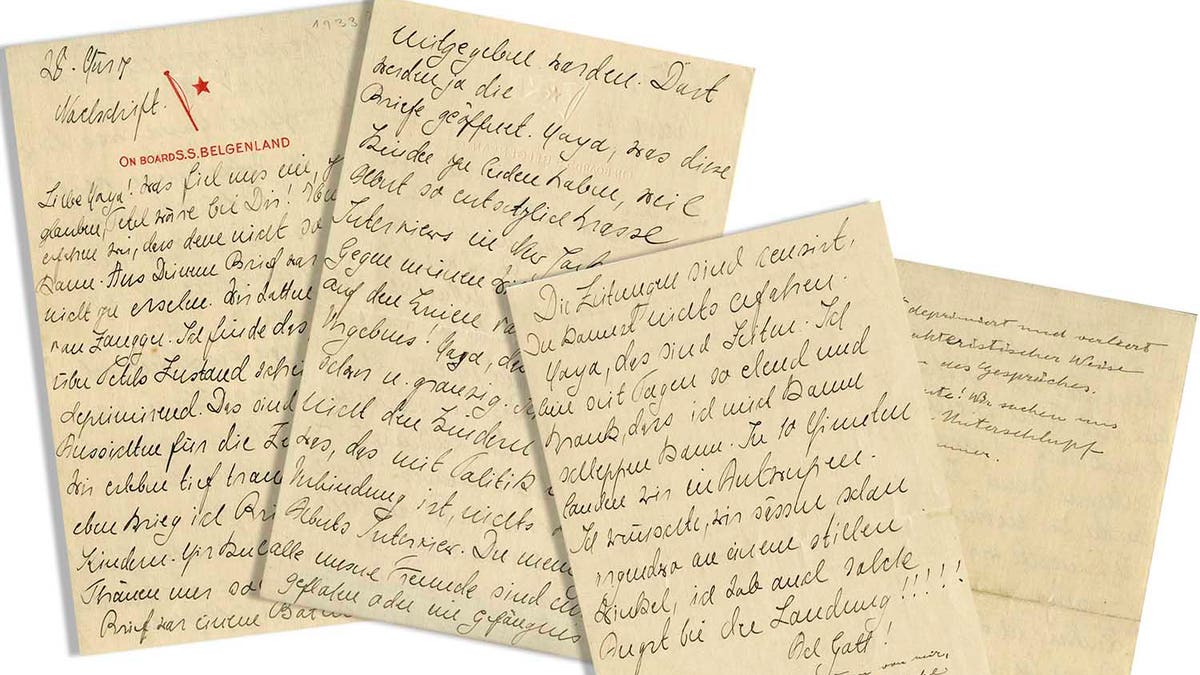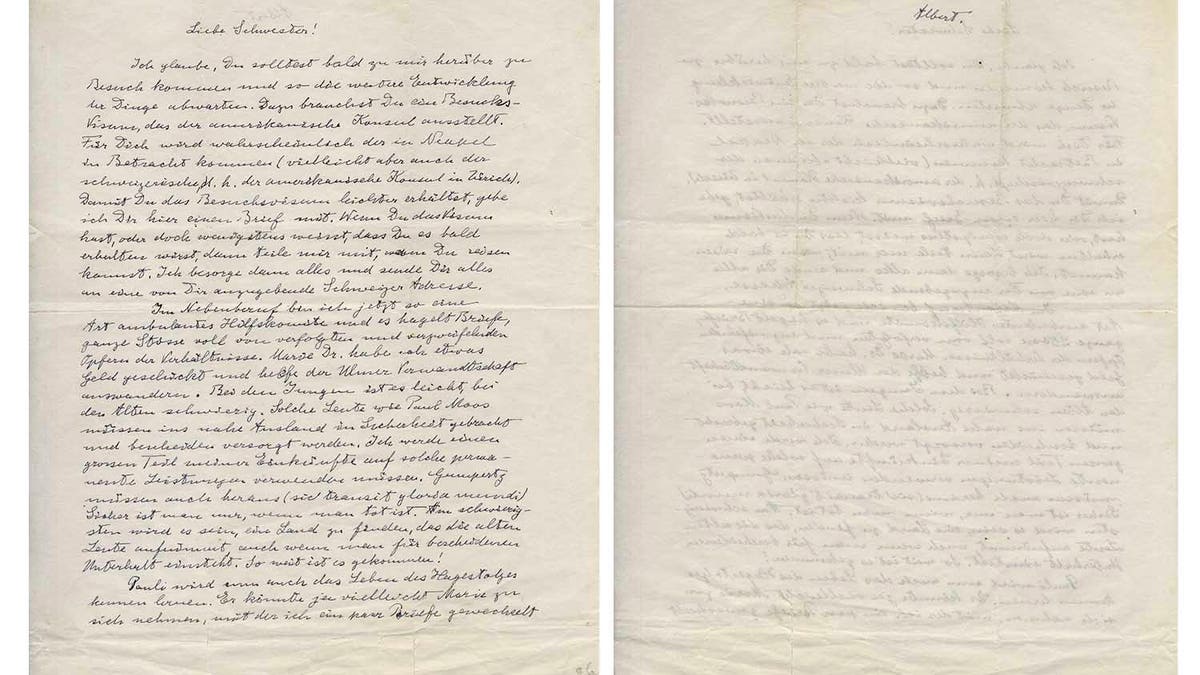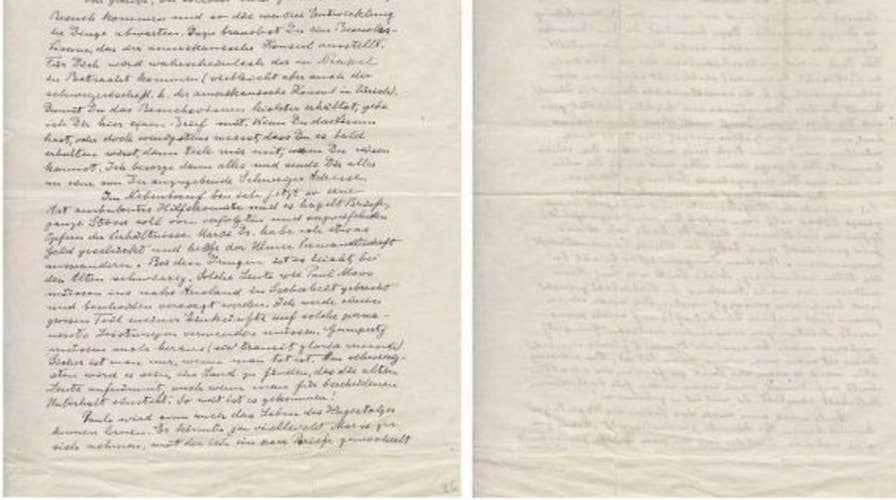Rare Einstein letters reveal escape from Nazis
Letters written by Albert Einstein that detail his escape from the Nazis are being auctioned off.
Two letters written by world-renowned scientist Albert Einstein are set to go up for auction this week, detailing his escape from the Nazis and his work helping Jews escape Hitler's regime.

(Credit: Nate D. Sanders Auctions)
Being sold in two separate lots, the letters give additional insight into Einstein's life, especially during the period after Adolf Hitler came to power in Germany.
Einstein wrote both letters to his sister, Maja Winteler-Einstein, according to auction house Nate D. Sanders Auctions. The first was written on March 28, 1933, aboard the S.S. Belgenland on the day he renounced his German citizenship. The second was written on Dec. 14, 1938, attempting to persuade Maja to leave Switzerland and come to the U.S. as he attempted to help Jewish refugees escape the Nazi regime.
EINSTEIN'S DIARIES CONTAIN SHOCKING DETAILS OF HIS RACISM
The 1933 letter, which is four-pages in its entirety, was written by Einstein and his wife Elsa shortly after Hitler came to power in Germany. Einstein's Berlin apartment was raided twice by the Nazis, in February and March of that year. The Nazis also published a photo of Einstein with the caption "not yet hanged" and placed a $5,000 bounty on his head.
Despite friends trying to persuade him not to return from a stay in the U.S., Einstein and his wife were planning to go back to their summer cottage in Caputh, Germany, but they ultimately made the decision not to return once they learned of the ransacking of his apartment. Einstein turned in his German passport to the German consulate in Antwerp, Belgium.
Elsa started the letter showing great concern for Tetel, Albert's son from his first marriage.

(Credit: Nate D. Sanders Auctions)
“Dear Maya [sic]! What were we thinking, believing that Tetel [Einstein's son] were staying with you! We just found out that this is not possible…these children are suffering terribly because of the horribly crass interview Albert gave in New York. Against my will! I was imploring him, on my knees. In vain! / Maya [sic], life is difficult and horrible. No matter what, do not write anything related to politics to the children, nothing of Albert's interview. Oh my God, all of our friends either have fled or they are in jail.”
The letter continued, speaking of the political oppression going on at the time:
“The newspapers are censored. You cannot find out anything. Maya [sic] - what a time we live in! For days now, I have been so miserable and sick that I am barely able to drag on. We will be landing in Antwerp in 10 minutes. I wish that we were already ensconced in some quiet corner. And I am so scared during the landing, too!!!!! / Oh God!''
EINSTEIN'S THEORY OF HAPPINESS SELLS FOR $1.56M AT AUCTION
Einstein took over the letter from his wife and seemingly accepted their fate, according to the auction house Nate D. Sanders Auctions.
''Dear Maja, thinking that Tetel was with you was my mistake. It probably happened because you wrote about him in so much detail. Or possibly an unconscious wish [of mine] was behind it. He is actually doing fairly well but he is depressed and, in a characteristic way, will lose the thread of a conversation. / All the best! We will now look for a hiding place for the summer.''
In the Dec. 1938 letter, Einstein wrote:
“…As a sideline, I am now working as some sort of itinerant relief committee and buckets of letters are coming in, whole stacks full of persecuted and desperate victims of the current situation. I sent some money to Marie Dr., and I am helping the Ulm [city in Germany] relatives with emigrating. It is easy for the young ones, but difficult for the old ones…I will have to use a large part of my income for such permanent benefits and services. Gumpertz will have to leave as well (sic transit Gloria mundi [thus passes the glory of the world]). Only when you are dead will you be safe. The most difficult thing will be finding a country that will accept the old people, even if one provides a modest livelihood for them. That is how things have turned out by now!”
Bidding on each letter starts at $25,000 and both letters will be auctioned on June 28.
The letters mark a stark contrast in Einstein's mindset from his earlier days. A recently published book of never-before-seen private travel diaries from the 1920s revealed that Einstein was racist in his early life, especially toward Chinese people.
Einstein died in 1955 at the age of 76.
Follow Chris Ciaccia on Twitter @Chris_Ciaccia









































